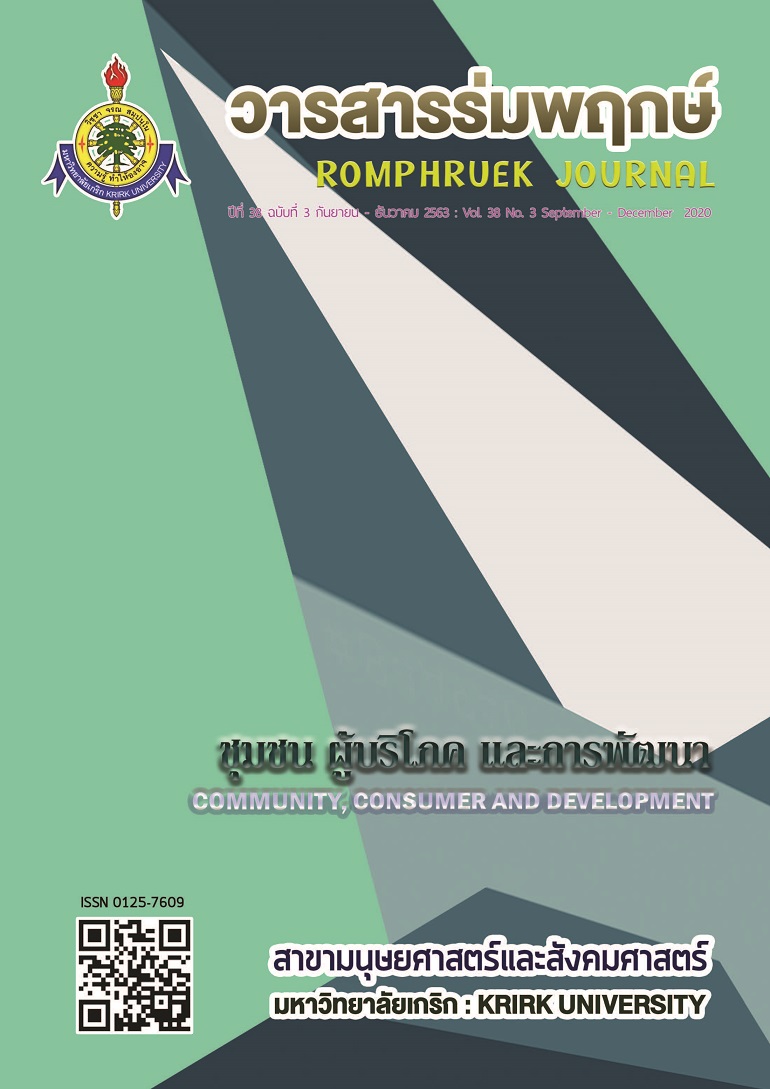Guidelines for Sustainable Development of Community-Based Tourism : A Case Study of Tha Kha Floating Market, Amphawa District, Samut Songkhram Province
Main Article Content
Abstract
This research was the mixed methods research with exploratory sequential design using both qualitative and quantitative approaches. In-depth interviews were used as a method collecting the qualitative data from a sample of 10 respondents including a village headman, a managing director of Tha Kha floating market, vendors, tourists and government officials. The researcher selected specific key informants in order to examine guidelines for sustainable development of community-based tourism at Tha Kha floating market. The research instruments used in collecting the quantitative data were questionnaires administered with a sample of 402 Thai tourists visiting Tha Kha floating market selected by using convenience sampling technique which was a type of non-probability sampling. The statistic used in the study was logistic regression analysis in order to predict and ensure that the tourists would decide on returning to the floating market again. It was found that guidelines for sustainable development for community-based tourism at Tha Kha floating market corresponded to the empirical data. logistic regression coefficients of the decision-making model for the return of tourists were -2.519 -2.797 and 2.339 at the statistically significance level of 0.01 for all 3 dimensions including social, cultural and traditional dimension, economic dimension and environmental dimension respectively. The percentage of correct predictions was 30.9
Article Details
Every article published in the Romphruek Journal of the Humanities and Social Sciences is the opinion and point of view of the authors. Thery're not the viewpoint of Krirk University or the editored department. Any part or all of the articles for pablication must be clearly cited.
References
กัลยา วานิชย์บัญชา. (2544). หลักสถิติ. พิมพ์ครั้งที่ 6. กรุงเทพฯ : โรงพิมพ์แห่งจุฬาลงกรณ์มหาวิทยาลัย
กองเศรษฐกิจการท่องเที่ยวและกีฬา สำนักงานปลัดกระทรวงการท่องเที่ยวและกีฬา กระทรวงการท่องเที่ยวและกีฬา. (2562). สถานการณ์ด้านการท่องเที่ยวเดือนธันวาคม 2562. (15 กุมภาพันธ์ 2563) สืบค้นจาก https://www.mots.go.th/ download/ article/article_ 20200123132729.pdf
ณัฏฐพัชร มณีโรจน์. (2560). การจัดการการท่องเที่ยวโดยชุมชน. วารสารวิชาการการท่องเที่ยวไทยนานาชาติ, 13(2), 25-46.
ทวีศักดิ์ นพเกษร. (2549). วิธีการวิจัยเชิงคุณภาพ เล่ม 2. พิมพ์ครั้งที่ 2. นครราชสีมา : โชคเจริญมาร์เก็ตติ้ง.
ธนัชชา ฤทธิ์เดช. (2558). แนวทางการพัฒนากิจกรรมการท่องเที่ยวและแหล่งท่องเที่ยวให้เกิดความยั่งยืนของตลาดน้ำอัมพวา จังหวัดสมุทรสงคราม. คณะบริหารธุรกิจ มหาวิทยาลัยราชภัฏสวนดุสิต, กรุงเทพมหานคร.
พิมพ์ลภัส พงศกรรังศิลป์. (2557). การจัดการการท่องเที่ยวชุมชนอย่างยั่งยืน : กรณีศึกษาบ้านโคกไครจังหวัดพังงา. Veridian E-Journal. 7(3), 650-665.
ทรงศักดิ์ ภูสีอ่อน. (2551). การประยุกต์ใช้ SPSS วิเคราะห์ข้อมูลงานวิจัย. กาฬสินธุ์ : ประสานการพิมพ์.
พวงรัตน์ ทวีรัตน์. (2543). วิธีการวิจัยทางพฤติกรรมศาสตร์และสังคมศาสตร์.(พิมพ์ครั้งที่ 7) กรุงเทพมหานคร : สำนักทดสอบทางการศึกษาและจิตวิทยา มหาวิทยาลัยศรีนครินทรวิโรฒ.
พจนา สวนศรี และ สมภพ ยี่จอหอ. (2556). คู่มือมาตรฐานการท่องเที่ยวโดยชุมชน. เชียงใหม่ : หจก.วนิดาการพิมพ์
ภราเดช พยัฆวิเชียร. (2539). พัฒนาท่องเที่ยวไทยในทิศทางที่ยั่งยืน. จุลสารการท่องเที่ยว, 15(2), 17.
มนัสสินี บุญมีศรีสง่า. (2556). ปัจจัยที่ส่งผลต่อความพึงพอใจและพฤติกรรมของนักท่องเที่ยวชาวไทยที่มีต่อตลาดฉัตรศิลาในอำเภอหัวหิน จังหวัดประจวบคีรีขันธ์. คณะบริหารธุรกิจ มหาวิทยาลัยศิลปากร วิทยาเขตสารสนเทศเพชรบุรี, เพชรบุรี.
วีระพล ทองมา. (2559). การท่องเที่ยวโดยชุมชน (Community Based Tourism : CBT) สำหรับการพัฒนาคุณภาพชีวิตของชุมชนในเขตที่ดินป่าไม้. (15 มีนาคม 2563) สืบค้นจาก www.dnp.go.th/fca16/file/i49xy4ghqzsh3j1.doc.
โศรยา สิ่งชูวงศ์. (2546). วิวัฒนาการแหล่งท่องเที่ยวกรณี เกาะช้าง จังหวัดตราด. คณะสังคมศาสตร์ มหาวิทยาลัยมหิดล,
กรุงเทพมหานคร.
สุถี เสริฐศรี. (2557). แนวทางการจัดการท่องเที่ยวอย่างยั่งยืนในชุมชนคลองโคนอําเภอเมือง จังหวัดสมุทรสงคราม. คณะศิลปศาสตร์ วิทยาลัยมหาวิทยาลัยกรุงเทพ, กรุงเทพมหานคร.
สุภางค์ จันทวานิช. (2546). คู่มือการวิจัยเชิงคุณภาพเพื่องานพัฒนา. สถาบันวิจัยและพัฒนามหาวิทยาลัยขอนแก่น, ขอนแก่น.
สินธุ์ สโรบล อุดร วงศ์ทับทิม และ สุภาณี ทรงพรวาณิชย์. (2545). การท่องเที่ยวโดยชุมชน : แนวคิด และประสบการณ์. เชียงใหม่ : มิ่งเมืองนวรัตน์.
Creswel, J. W., & Plano Clark, V. L. (2011). Designing and conducting Mixed Methods Research. 2nd ed. Thousand Oaks, CA : Sage.
Creswel, J. W. (2015). A concise Introduction to Mixed method Research. Los Angeles : Sage.
Dickman, C. R. (1996). Overview of the Impacts of Feral Cats on Australian Native Fauna. Australian Nature Conservation Agency, Canberra, Australia.
Lee CK, Back KJ. (2003). Pre and post casino impact of residents perception. Annals of Tourism Research. 27(30), 868–885.
Kampetch, P and Jitpakdee, R. (2017). Success factors for management by community based tourism to sustainable. Proceeding of The 7th STOU National Research Conference November 24, 2017 Sukhothai Thammathirat University Bangkok, 564-575.
Nunnally, J. C. (1978). Psychometric Theory. New York : McGraw-Hill.
Shao Q. (2007). Develop rural tourism and facilitate new rural area construction. Qiushi, 46(4), 42–44.
Zapata, Maria Jose, Michael C. Hall, Patricia Lindo & MiekeVandershaeghe. (2011). Can Community-Based Tourism Contribute to Development and Poverty Alleviation? Lesson from Nicaragua. Current Issue in Tourism, 14(8), 725 – 749


